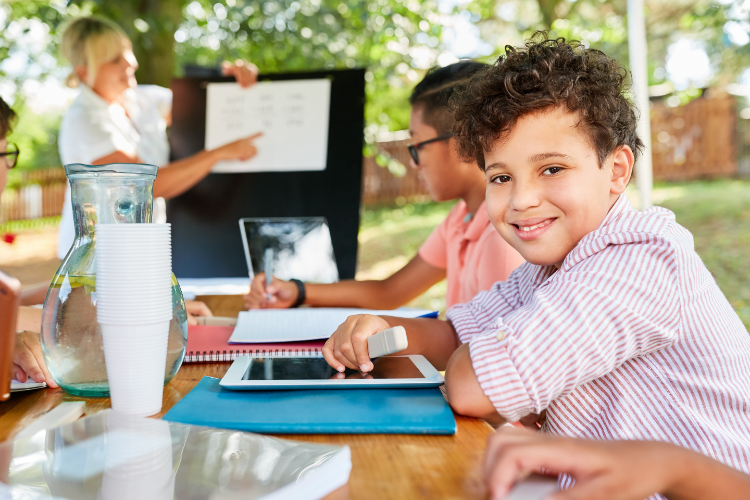
Summer break is all about fun, right? Then why do schools assign summer homework? Teachers worry about the very real summer slide. This term refers to the learning loss that many kids experience during the long break from school.
This can impact their progress, especially in reading, science, and math. Let’s dive into what the summer slide is and how we can help our children stay on track.
What Is the Summer Slide?

The summer slide is a common issue where students lose some of the academic skills they gained during the school year. On average, kids lose about one month of learning over the summer, with math skills taking the hardest hit. Reading skills can also decline, though the impact can vary widely.
Why Does It Happen?
Several factors contribute to the summer slide. Learning is not static. Like plants with water, learning grows or wilts. The human mind needs continuous learning - scaffolding and building on previous learning - in order to cement new knowledge and skills. Just like muscles weakening without exercise, academic skills can fade without practice.
Additionally, during the summer, kids might not have the same routine that keeps them engaged in learning. Without the regular reinforcement of schoolwork, it’s easy for them to lose some of the skills they’ve gained over the school year.
Recent Insights

Recent research highlights how significant the summer slide has become, particularly with the added challenges from the COVID-19 pandemic. The Northwest Evaluation Association (NWEA) conducted a study in 2021 that showed students could return to school with only 70% of the typical reading gains and less than 50% of the math gains compared to a regular school year.
Other research found that structured summer math programs significantly helped students improve their math skills. This research indicates thattargeted summer programs can effectively counteract the summer slide, particularly in math, which often suffers the most during the break.
Moreover, additional research showed that summer reading programs not only help maintain reading skills but can also lead to gains in literacy. The study emphasized that programs involving parental involvement and structured activities were particularly effective. These findings stress the importance of engaging both students and parents in summer learning efforts.
How Can We Help Our Kids?

Addressing the summer slide requires a combined effort from parents, teachers, and the community.
Here are some practical strategies to help keep your child’s learning on track:
- Encourage Summer Reading: Regular reading can help maintain and even improve reading skills. Many schools and libraries offer summer reading programs with fun incentives to keep kids engaged. Set aside some time each day for reading, any reading: comics, newspapers, books, anything. Here’s a good place to start.
- Summer Bootcamps: Short, intensive review programs can provide a rapid way to refresh skills and preview upcoming topics. Think of it as a subject specific jump-start to help recover the lost learning and give your student a head start on recovering the lost month. They offer focused learning, reinforce fundamental skills, and boost confidence. By engaging in interactive activities, students regain a taste of the classroom environment. The House has great bootcamps for exactly this. We can help bridge gaps and ensure students are ready for a successful academic year.
- Enrichment Activities: Look for summer camps, educational programs, or extracurricular activities that focus on science, technology, engineering, math (STEM), or the arts. These programs can provide valuable learning experiences and help prevent the summer slide. Many organizations offer scholarships or sliding scale fees to make these opportunities accessible to all families.
- Get Involved: As a parent, you play a crucial role in your child's education. Create a home environment that values learning, set aside time for educational activities, and model good reading habits. Show interest in what your child is learning and offer support and encouragement.
- Use Community Resources: Libraries, community centers, and nonprofit organizations often offer free or low-cost educational programs during the summer. These resources can provide structured learning opportunities, especially for families who might not have access to private programs. Check out your local library for summer reading challenges, workshops, and other events.
- Customized Private Tutoring: A great tutor can work with you to build a personalized plan to cover the critical subjects coming up in the next year and to help keep your student accountable. At The House, we have spent the last 15 summers building fun and effective personalized summer plans for students to reinforce last year's learning, teach the material to come, and keep kids on track with their parent's goals. Tutoring can last all summer or be just a few sessions right before the start of the school year. Learn more here.
Practical Tips for Parents

Here are some additional tips to help your child stay engaged and learning over the summer:
- Create a Routine: Establish a daily schedule that includes time for reading, math practice, and other educational activities. Consistency helps children know what to expect and keeps them in a learning mindset.
- Set Goals: Work with your child to set achievable learning goals for the summer. This could be reading a certain number of books, mastering a new math skill, or completing a science project.
- Avoid Social Jet Lag: Switching from school routines to a relaxed summer can cause social jet lag in teens, disrupting sleep patterns and impacting health, mood, and academic performance. Encourage a balanced approach with consistent sleep schedules, healthy habits, and structured activities to help them enjoy summer while staying healthy and ready for school.
Learning Should Never Fully Stop

The summer slide is a common issue that can affect your child’s academic progress, but there are plenty of ways to combat it. By encouraging reading, making math fun, participating in enrichment activities, getting involved, and using community resources, you can help ensure your child is ready to hit the ground running when school starts again.
Remember, learning should not pause completely while school is out. With a little planning and creativity, you can turn summer into a time of growth and discovery for your child.
